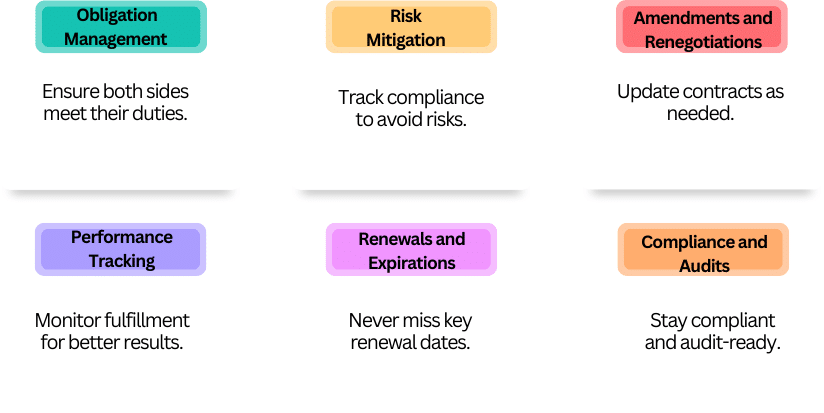What is Contract Execution?
Contract execution is the key point in the contract management cycle. This is when the signed agreement starts to work. It requires all parties to meet their responsibilities as stated in the agreement. This stage is important for putting the terms and conditions into practice. Stay tuned for helpful tips on how to improve what happens after contract execution. This will help keep everything running smoothly and increase business success.
What Happens After Contract Execution?
After an agreement is completed, the focus moves to managing and monitoring it well. This means keeping an eye on important milestones, making sure the terms are followed, solving any disputes, and checking performance against targets. By having strong processes after execution, businesses can reduce risks, improve teamwork between parties, and achieve successful results from the agreement.
You might like to read this article: Best Contract Management Software: Top 10 CLM in 2024
Importance of Efficient Contract Post Execution Management

Managing agreements well after they are signed is very important. It is not just a job to finish. Both large and small companies need to do this. After a agreement is signed, businesses start to see the real benefits of their agreements.
We can only succeed if we carefully read the agreement terms. If we do not pay attention, we might miss important milestones. This can cause money problems, issues with the rules, and can hurt our business relationships.
Ensuring Compliance Post Contract Management
When an agreement is signed, it creates a clear list of legal obligations and compliance requirements for everyone involved. After the signing, management makes sure that all obligations are met on time and that the agreed terms are followed.
Good management after finishing the agreement helps companies make the best use of them. By keeping an eye on deadlines, milestones, and performance goals, businesses can find ways to improve their document. This can lead to better deals in future agreements and help avoid problems.
Neglecting these important parts can cause missed deadlines. It can also lead to financial penalties, legal problems, and harm to a company’s image. In today’s complicated business world, rules and agreements are always changing. Good management after execution is important for lasting success.
The Role of Systematic Oversight in Contract Post Execution
After you sign an agreement, you should follow some steps. First, ensure that all necessary parties have the information and tools they need to do their work. Next, establish clear ways to communicate. Then, identify who is responsible for each task. Finally, use a good tracking system to keep everything organized.
Effective document means being quick and smart. It is important to look closely and find issues before they get bigger. Businesses should keep an eye on deadlines, monitor changes, and make sure everyone follows the terms of the agreement.
By creating a culture where everyone knows their role and is responsible, companies can handle their tasks more effectively. This method can reduce risks and make the contract management experience better. A strong foundation like this adds more value throughout the contract lifecycle.
You might like to read this article:
Monitoring and Managing Key Contract Dates

It is very important to watch key dates in agreement. This includes dates for renewal and expiration. Keeping an eye on these dates helps you avoid missed chances and money problems. You can set up reminders for these important dates. This way, you will not forget about them. You can then get things done on time.
Missing a contract renewal date can cause the agreement to end. This can disturb how the business operates. If a company does not notice the expiration date, it may have to stick to terms that are not good. It could also lose chances to make better agreements.
Strategies for Renewal and Expiration Tracking
Having a clear way to handle document renewals is important for keeping your business running smoothly. A good system helps you make the best use of your agreement. You need an effective way to track renewals. This system should remind you on time. It should also give you enough time to read, negotiate, and finish document renewals easily.
The execution date of an agreement starts the tracking process. After this date, you can create automatic reminders. These reminders will tell people about renewals or expiration dates that are coming up. This gives businesses the time they need to check how the agreement is doing. They can see its value and decide if they want to renew or end the agreement.
A good renewal plan does more than just send reminders. It also checks the current agreement terms and looks at the market trends. It takes into account any new business needs. When businesses work on document renewals wisely, they have a better chance to negotiate for better terms. They might secure lower prices or look into other options if necessary.
Utilizing Automated Reminders for Efficient Management
Automated reminders are really helpful in managing agreements. They help keep track of important tasks and deadlines. This is especially true after an agreement is signed. When businesses add automated reminders to the contract lifecycle, they lower the chance of making mistakes.
You can set up reminders to let important people know about key dates, milestones, and events during the contract lifecycle. This might include payment due dates, performance reviews, or times for document renewals. Automated reminders send alerts on time. This helps keep everyone informed and responsible.
These reminders can be changed to fit different business needs and choices. You can receive them by email or as alerts in the app. Contract management systems provide this flexibility. This helps important information get to the right people on time. This automation lets agreement managers focus on more important tasks. They can be sure that daily tasks are done properly.
Executed contract vs. executory contract vs. effective date
|
Term |
Definition |
Importance in Contract Management |
|
Executed Contract |
A agreement that has been fully completed, with all necessary parties fulfilling their obligations. |
Indicates that the agreement is finalized and enforceable, helping businesses track completed agreements. |
|
Executory Contract |
A agreement that is still in the process of being fulfilled; all obligations have been completed. |
Highlights ongoing responsibilities and helps in monitoring progress toward fulfillment. |
|
Effective Date |
The date when a agreement becomes enforceable & binding on the parties involved. |
Critical for establishing timelines and ensuring compliance with contractual obligations. |
You might like to read this article:
Contract renewals, extensions, and terminations

Managing contract renewals, extensions, and terminations is important for strong business relationships. With Contract Lifecycle Management (CLM), you can efficiently track expiration dates and handle terminations quickly. Automating the renewal process is essential for effective document management, helping businesses avoid losing money and expensive legal issues. Using CLM software can make these tasks easier by providing a clear way to manage renewals, extensions, and terminations efficiently and on schedule.
The importance of tracking contract expiration dates
Missing renewal or expiration dates can be costly. Good contract management requires keeping track of when the agreement ends. This helps in reviewing and acting on agreement on time. It can prevent the agreement from ending unexpectedly and help in renegotiation. By closely watching expiration dates, businesses protect themselves from revenue leakage and maintain strong business relationships. Automated reminders and alerts make this easier. This boosts efficiency and helps people meet their contractual obligations. Tracking document expiration dates is crucial for effective contract lifecycle management.
Handling contract terminations efficiently
It is very important to end the agreement the right way. This can help you avoid legal issues and keep good business relationships. To do this well, follow the document terms. You need to notify all necessary parties and meet your legal obligations. Managing the ending of an agreement properly can stop revenue leakage and costly lawsuits. Using best practices and contract management software can make this process simpler.
Automating renewal and extension processes
To make dealing with agreements easier after they are signed, automate the renewal and extension steps. Contract management software can help companies keep track of important dates, like when agreements renew or end. With automation, reminders are sent on time. This lowers the chances of missing big events or making costly mistakes. A smart way to manage agreement improves the whole process. It allows teams to focus more on important tasks instead of just paperwork. Automating renewals and extensions also saves time. Plus, it builds stronger business relationships by ensuring effective contract management practices.
You might like to read this article:
The Importance of Contract Post Execution

To keep things running well and reduce risks, good contract management is important after a document is signed. Once a document is in place, it needs to be monitored closely. This helps meet legal obligations and enjoy all the benefits. Strong management makes sure everyone follows the terms and improves the contract lifecycle. Using contract management software and having organized processes can help companies simplify things and stop revenue leakage. A focus on management after signing is key to successful contract execution.
How CLM software simplifies the contract post-execution process
Using Contract Lifecycle Management (CLM) software helps organizations manage what happens after agreements are signed. CLM software makes important tasks easier. It can track agreement terms and key dates. It also checks compliance needs. There is a central space to store and manage signed agreements. This helps cut the risk of losing money and facing costly litigation. Additionally, CLM software ensures all necessary parties are part of the contract management process. This boosts visibility and accountability. A clear process simplifies the work after agreements are executed. This helps with effective contract management.
You might like to read this article:
How to use Volody in tracking contract post-execution?

After the execution of a fully executed agreement, using a tool like Volody can help manage and track all aspects of the agreement, from its terms to compliance. Here’s how you can utilize Volody effectively contract post execution:
Key Features of Volody
- Contract Tracking: Monitor important items such as payment schedules, scope of work, and any conditions outlined in the executed agreement. This ensures all parties adhere to the agreed-upon terms.
- Obligation Management: Keep track of each party’s obligations as stated in the document. This helps prevent any lapses that could lead to disputes.
- Legal Compliance: Collaborate with your legal team to review the enforceability of agreements and ensure compliance with any regulatory requirements.
- Notifications: Set up reminders for key deadlines related to renewals, audits, or other crucial steps in the contract lifecycle management process.
By effectively leveraging Volody for tracking contracts post-execution, businesses can enhance their contractual relationships and foster a culture of accountability and diligence. Always remember to seek legal advice when navigating complex agreements or making significant changes to document terms. This proactive approach not only mitigates risks but also strengthens your organization’s legal standing.
Conclusion
Efficient processes for documents after they are signed are very important for business success. It is vital to follow the rules and get the best value from document. Staying organized helps businesses run well and be more productive. A centralized contract management system makes access and tracking easy. It also gives important tools for good management. By tracking key document dates, like renewals and expirations, with automatic reminders, everything becomes simpler. Using these methods leads to better operations and stronger business relationships. For more tips on automating contract management, feel free to contact us for a consultation today.
FAQs
How can automated reminders streamline contract post-execution processes?
Automated reminders are important for good contract management. They send alerts about compliance requirements, contractual obligations, and key dates. This helps make sure that nothing is forgotten. They are essential for managing a document well after it is signed.
What are the common challenges faced during contract post-execution contract processes?
Common issues in contract management after documents are signed include problems with compliance, poor oversight, and difficulty in tracking key dates. These problems can cause missed renewal deadlines. This can reduce the value of contracts. A centralized contract management system can help fix these problems.
What are some best practices in contract post-execution contract management?
Regular audits and alerts for important events are very important for better efficiency and accuracy in the document after it is executed. Good communication with everyone involved helps, too. Using technology to store everything in one place and check that it meets rules also makes the process easier.





